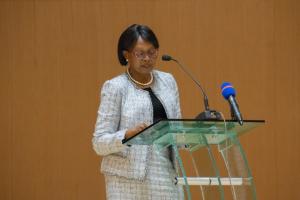Rising cases of sickle cell disease prompts calls for urgent action
Brazzaville, 12 July 2018 - The WHO Regional Director for Africa Dr Matshidiso Moeti has called for more investment, stronger collaboration and partnerships to stem the tide of the rising cases of sickle cell disease in Africa. Dr Moeti was speaking at the opening ceremony of the Congress of the African Society of Hematology which opened today in Brazzaville, Congo.
“Our States alone, without the precious support of partners, will not be able to cope with information, communication, education, screening, case management and also basic research in this field.
Sickle cell disease affects an increasing number of people but is still unknown to the general public. More than 66% of the 20 million people in the world with sickle cell disease live in Africa. The condition can cause extreme pain, life-threatening infections and other complications such as stroke or loss of vision. The disease can interfere with many aspects of the patient’s life, including education, employment and psychosocial development. Despite the disastrous consequences, they do not receive adequate attention.
“In particular, the sources of funding for the fight against these diseases and the technical partners involved are insufficient,” she stressed, adding that the burden of blood-related diseases could be considerably reduced if cost-effective preventive and curative measures and interventions are implemented in a balanced and coordinated manner.
In 2008, Ministers of Health from the WHO African region adopted a regional strategy to combat sickle cell disease and in some countries where sickle cell disease is a major public health concern, control programmes do exist. However these have neither the national coverage nor basic facilities to manage patients. Systematic screening for SCD using a simple blood test is not a common practice, and diagnosis is usually made when a severe complication occurs.
Counselling and prevention of causes and infections are simple measures not readily accessible to most patients. As a result, the majority of children with the most severe form of the disease die before the age of five, usually from an infection or severe anaemia.
Stressing the urgent need to tackle the disease, the First Lady of Republic of Congo, Mrs Antoinette Sassou-Nguesso who is a strong advocate to end sickle cell disease said: “I call upon each one of us to continue to make an effort so that together with our brothers and sisters from other continents, we can win the noble fight against blood diseases in Africa."
The event attracted over 200 delegates including experts from Americas, Europe and Africa to exchange and share their experiences on sickle cell disease, blood cancers and blood transfusion.
Communications Officer ai
WHO Congo
Tel: +242 06 624 9763
Email: moussokij [at] who.int (moussokij[at]who[dot]int)
Communications and marketing officer
Tel: + 242 06 520 65 65 (WhatsApp)
Email: boakyeagyemangc [at] who.int (boakyeagyemangc[at]who[dot]int)



